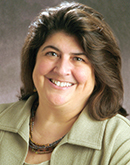The patient suffered from congestive heart failure. She had become weaker, but her condition was not sufficiently grave for admission to hospice.

Yosick
Lori Yosick, of Mount Carmel Health System in Columbus, Ohio, calls the patient's health status "a gray area of care." Fortunately for the patient, a woman in her late 70s, the staff of Mount Carmel Hospice and Palliative Care was able to assist her. But Yosick, executive director of the program, said too many chronically ill patients with poor symptom management aren't identified until they become critically ill or need hospice. The result is more unmanaged pain, a lower quality of life for patients and more readmissions to hospitals.
"Too often, referrals to community palliative care are very subjective," said Yosick. "Patients go home without enough support. So they're soon back in the ER." Meanwhile, she said, one-third of patients die within the first week of admission to hospice. "So why didn't someone notice earlier?" Yosick asked.
That question inspired the health system's hospice and palliative care program to develop a methodical, computer-based predictive analytics system for better identifying patients with advanced illnesses who could benefit from palliative care services in their homes.
Profiling patients
Mount Carmel Health System received a $602,000 innovation grant from its parent Trinity Health to develop the analytics tool. Yosick's staff worked with Medigold, a major Medicare Advantage plan in Ohio, and Turn-Key, a software company in Philadelphia, to build the system, which takes into account numerous factors of a patient's history, including health conditions, number of hospital admissions or visits to emergency rooms or doctors, and medications taken.
Yosick said the grant covers the computer programming and a staff of two nurse case managers, one advanced practice nurse and two social workers. Armed with better information, the new palliative-care team can work with many more eligible patients and tailor healthcare plans to keep them functioning in their homes.
"We want to provide a continuum of care for people with advanced illnesses who aren't on a course to be cured," she said. "They aren't dying, they aren't in hospice, but we can manage their symptoms and pain and give them a better quality of life."
The four-hospital system in central Ohio formally instituted palliative care in 1997. Until a few years ago, Yosick said, most of the 3,000 palliative care patients served each year were in the hospital. In 1997, 80 percent of the patients in palliative care had cancer, she said. Now, those patients make up 35 percent of the people served.
As care expanded, she said, many more patients are helped to cope with such chronic and advanced issues as chronic obstructive pulmonary disease or renal disease, sometimes complicated by forms of dementia.
Tell grandma
Through the new program, the hospital identified and contacted about 200 patients beginning in September, informing them of the "advanced illness management that will be available to them," Yosick said. The five staff members reached out with telephone calls and home visits. More than half of those patients already have care plans coordinated with their primary physicians, she said. Ongoing care can include regular follow-up visits to the patients' homes and telephone calls to remind them of appointments with caregivers.
She said the staff is experienced in helping patients come to understand their advanced illnesses and accept treatment plans for symptom management that may enable patients to stay in their homes.
"There are some people who say, 'Don't tell that to grandma.' But most patients want to know the facts," she said. "Our staff is very skilled at those conversations, even when they can be jarring. We try to frame it in terms of offering the best in care and letting patients know they have some control over their quality of life."
In many cases, she said, that can mean services as simple as ensuring that patients can get to doctors' appointments and obtain — and take — their medications. It can include counseling. Preparing care plans and following up also means that a health system can better estimate when a patient suffering chronic illness should enter hospice care.
Yosick said patients often are grateful that the staff contacted them. "Some have said, 'Nobody ever asked me these questions before,'" she said, referring to issues from power of attorney at end of life to daily coordination of medications.
She said outpatient palliative care is offered regardless of patient income status, noting that some patients referred by clinics had been in homeless shelters. She said Mount Carmel Health System will continue the program beyond the grant and will bill for services through Medicare and insurance programs. And she said it will offer the assistance regardless of ability to pay.
Her staff is inspired by a speech by Pope Francis in March before the Pontifical Academy for Life at the Vatican. An excerpt is framed on a wall in Yosick's office. It says in part, "Palliative care is an expression of the properly human attitude of taking care of one another, especially of those who suffer. It bears witness that the human person is always precious, even if marked by age and sickness."
Said Yosick, "This fits the mission of Mount Carmel and all of Catholic health care. Palliative medicine is one of the core values of patient care in all areas of life. We want to close one of the gaps."
Copyright © 2015 by the Catholic Health Association
of the United States
For reprint permission, contact Betty Crosby or call (314) 253-3477.